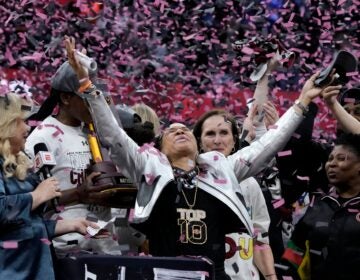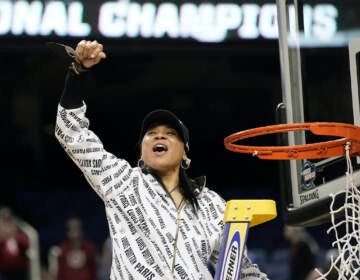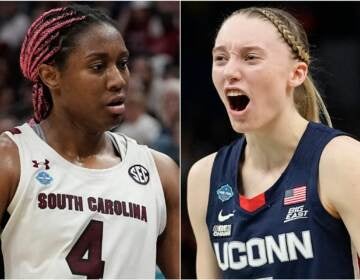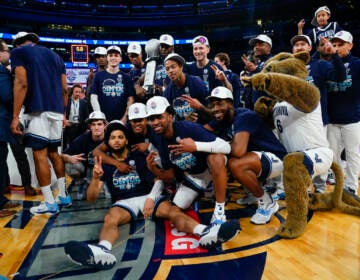U.S. appeals court says some NCAA athletes may qualify as employees under federal wage-and-hour laws
The ruling follows a Supreme Court case that led the NCAA to allow athletes to profit from their “Name, Image and Likeness.”
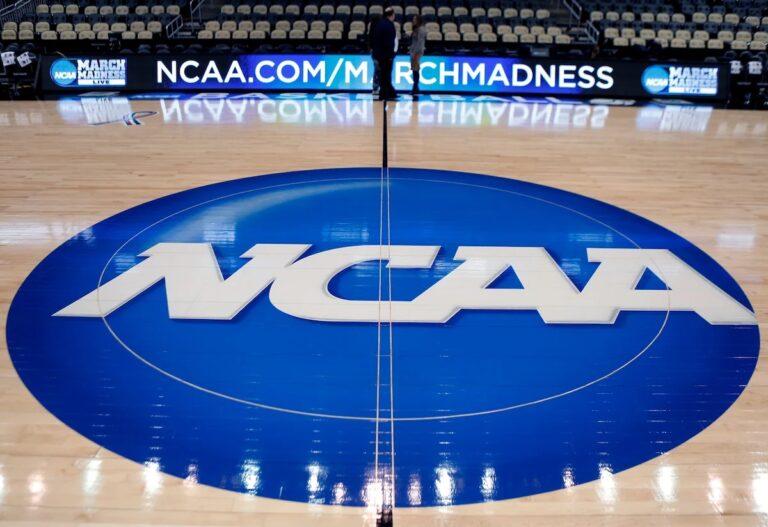
NCAA logo, displayed at The Consol Energy Center in Pittsburgh, in March of 2015. (AP Photo/Keith Srakocic, File)
College athletes whose efforts primarily benefit their schools may qualify as employees deserving of pay under federal wage-and-hour laws, a U.S. appeals court ruled Thursday in a setback to the NCAA.
The court, in the latest challenge to the NCAA’s long-held notion of “amateurism” in college sports, said that a test should be developed to differentiate between students who play college sports for fun and those whose effort “crosses the legal line into work.”
“With professional athletes as the clearest indicators, playing sports can certainly constitute compensable work,” U.S. Circuit Judge L. Felipe Restrepo wrote. “Ultimately, the touchstone remains whether the cumulative circumstances of the relationship between the athlete and college or NCAA reveal an economic reality that is that of an employee-employer.”
A colleague, in a concurring opinion, questioned the difficulty of such a process, noting that nearly 200,000 students compete on nearly 6,700 Division I teams. The NCAA had hoped to have the case dismissed, but it will instead go back to the trial judge for fact finding.
The ruling follows a 2021 Supreme Court decision that led the NCAA to amend its rules to allow athletes to profit from their “name, image and likeness.” In May, the NCAA announced a nearly $2.8 billion revenue-sharing plan that could steer millions of dollars directly to athletes by next year.
The Division I athletes and former athletes behind the suit in Philadelphia are seeking more modest hourly wages similar to those earned by their peers in work-study programs. They argue that colleges are violating fair labor practices by failing to pay them for the time they dedicate to their sports, which they say can average 30 or more hours per week.
Lawyer Paul McDonald, representing the plaintiffs, has suggested that athletes might make $2,000 per month or $10,000 per year for participating in NCAA sports. He said that many students need the money for everyday expenses.
“This notion that college athletes cannot be both students and employees is just not accurate when you have student employees on campuses,” McDonald said Thursday. “It’s just beyond belief, the idea that the athletes would not meet the same criteria as employees.”
A district judge had refused to throw out the case, prompting the Indianapolis-based NCAA to ask the appeals court to stop it from going to trial. The three-member panel heard arguments in February.
Defendants include the NCAA and member schools including Duke University, Villanova University and the University of Oregon. An NCAA spokesperson did not immediately return messages seeking comment Thursday.
The unanimous Supreme Court decision that spawned the NIL payments lifted the ban on college compensation beyond full-ride scholarships. Schools recruiting top athletes now can offer tens of thousands of dollars in education-related benefits such as study-abroad programs, computers and graduate scholarships.
“Traditions alone cannot justify the NCAA’s decision to build a massive money-raising enterprise on the backs of student athletes who are not fairly compensated,” Justice Brett Kavanaugh wrote in a concurring opinion. “The NCAA is not above the law.”
But that case did not resolve whether college athletes are employees entitled to direct pay — the key issue before the 3rd U.S. Circuit Court panel.
Baylor University President Linda Livingston, speaking at the NCAA convention in January, said that model would turn coaches into their players’ bosses.
“Turning student-athletes into employees will have a sprawling, staggering and potentially catastrophic impact on college sports broadly,” said Livingston, chairperson of the NCAA’s Board of Governors. “We need Congress to affirm student-athletes’ unique relationship with their universities.”
But the relationship has faced increasing scrutiny.
In 2021, a top lawyer for the National Labor Relations Board said in a memo that college athletes should be treated as school employees.
And players have taken to social media to argue for a cut of some of the hundreds of millions of dollars that NCAA schools earn on sports, including a campaign on the eve of the 2021 NCAA basketball tournament that carried the hashtag #NotNCAAProperty.
The NCAA, at its convention, compared the athletes to students who perform in theater groups, orchestras and other campus activities without pay.
McDonald has said those types of campus groups are student led, while athletes have their time controlled by their coaches in a way that resembles employment.
“The most controlled kids on any campus are the student-athletes,” he said earlier this year.
WHYY is your source for fact-based, in-depth journalism and information. As a nonprofit organization, we rely on financial support from readers like you. Please give today.


